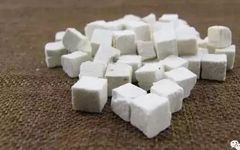Traditional Chinese Medicine (TCM) believes that: if dampness is not eliminated, there will be endless troubles! Therefore, it is crucial to remove dampness from the body. Below, I will introduce several Chinese herbs that can help eliminate dampness. When used in combination with other herbs, they can yield excellent results in dampness removal. Before that, let us first understand dampness!
The Three Typical Symptoms of Dampness
1. Thick and greasy tongue coating or serrated edges on the tongue
If there is a thick and greasy tongue coating, it may indicate heavy dampness. Even if there is no coating, observe your tongue; if it is swollen and has serrated edges, it also suggests heavy dampness.
2. Loose, unformed stools or intermittent constipation
Normal stools are smooth and cylindrical, and after each bowel movement, they should not stick to the smooth toilet bowl. If stools cannot be flushed cleanly, it is likely due to dampness in the body.
3. Fatigue, lack of energy, and excessive drowsiness
Feeling particularly fatigued, reluctant to move; joints feel tight and inflexible during activity; dizziness, easy to feel sleepy, and memory decline… these are all major symptoms of dampness.
Herbs that Help Remove Dampness
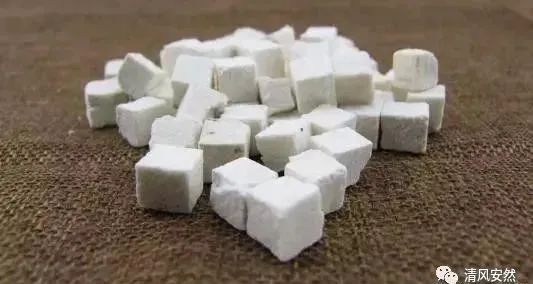
1. Fu Ling (Poria)
Fu Ling is sweet and bland, neutral in nature, and enters the heart, spleen, liver, and kidney meridians. It has the effects of strengthening the spleen and stomach, nourishing the brain and body, promoting urination and draining dampness, calming the mind, and is regarded as one of the “Eight Treasures” in TCM.
The characteristic of Fu Ling is that it tonifies without being harsh and drains without being forceful. Its properties are mild, capable of both supporting the righteous and expelling evil, making it an essential herb for those with spleen deficiency and excess dampness.
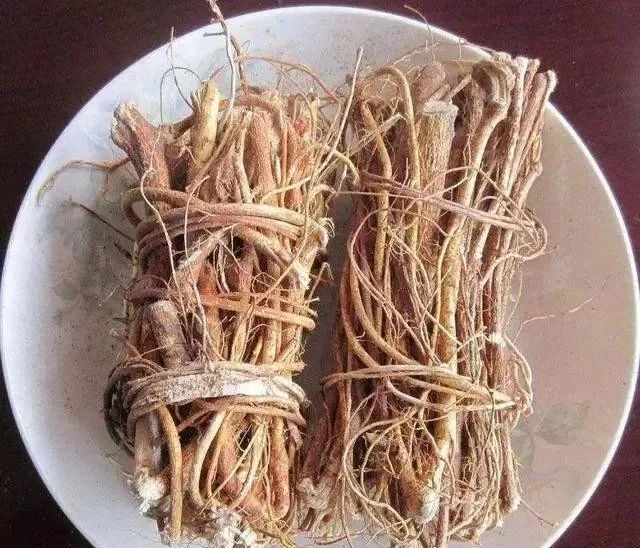
2. Wu Zhi Mao Tao (Five-Fingered Peach)
Wu Zhi Mao Tao is both a food and a medicine. Among many dampness-removing ingredients, it has a strong tonifying effect and can replenish the qi of the spleen and lungs. TCM believes it can strengthen the spleen, tonify qi, nourish the stomach, and eliminate dampness. When there is heavy dampness in the body, using Wu Zhi Mao Tao to make soup or drink can help with dampness removal and health maintenance.
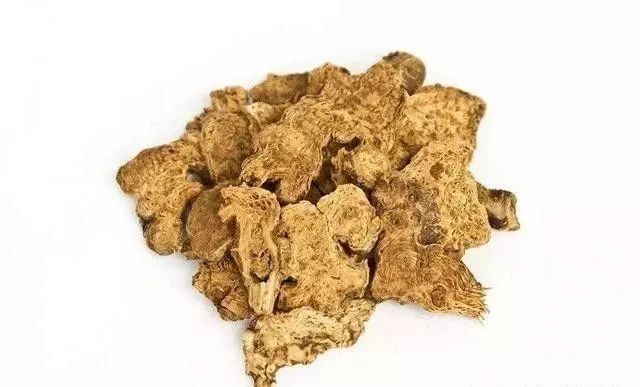
3. Cang Zhu (Atractylodes)
Cang Zhu is the rhizome of the perennial herb Atractylodes lancea and Atractylodes macrocephala. Its aroma can transform dampness, and its bitter taste can also eliminate dampness, thus having a strong dampness-removing effect. It helps to clear damp turbidity and strengthens the spleen, hence it has a spleen-strengthening effect.
Cang Zhu is suitable for symptoms caused by dampness obstructing the spleen and impaired transportation, such as loss of appetite, abdominal fullness, nausea, abdominal pain, diarrhea, and a white greasy tongue coating. It is often used in combination with Hou Po (Magnolia Bark) and Chen Pi (Dried Tangerine Peel).
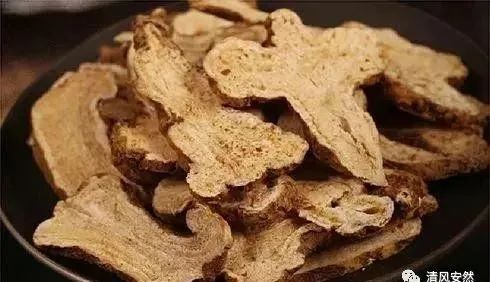
4. Bai Zhu (Atractylodes Macrocephala)
Bai Zhu has the functions of tonifying the spleen and benefiting the stomach, drying dampness, stopping sweating, promoting urination, and stabilizing pregnancy. According to the “Ben Cao Hui Yan,” Bai Zhu is “the key herb for supporting the spleen and stomach, dispersing dampness, and relieving food stagnation.”
Bai Zhu can improve symptoms of spleen and stomach deficiency, indigestion, loss of appetite, and diarrhea. It can also be used by those with jaundice, excessive sweating, edema, and difficulty urinating.
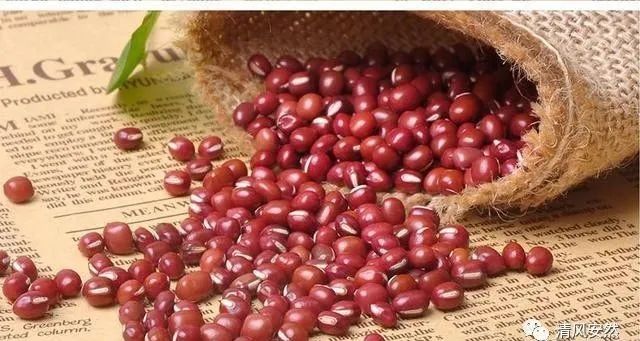
5. Chi Xiao Dou (Adzuki Bean)
Chi Xiao Dou is sweet and enters the heart and small intestine meridians. It has the effects of promoting urination and draining dampness, harmonizing blood, expelling pus, and detoxifying. Its heat-clearing effect is weaker than that of mung beans, but its ability to promote urination and eliminate dampness is stronger. It can treat general edema and even “big abdominal water disease,” which is ascites due to liver cirrhosis.
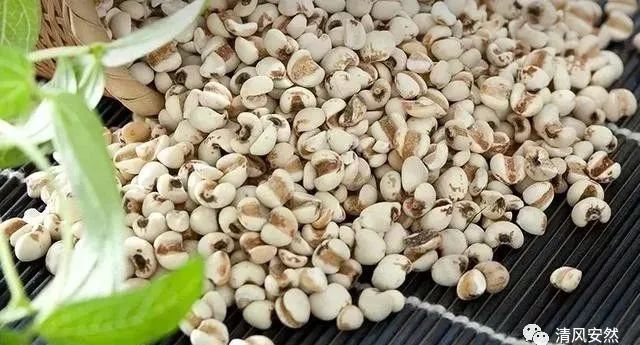
6. Yi Yi Ren (Job’s Tears)
Yi Yi Ren, known as “Coix Seed” in TCM, is listed as a superior herb in the “Shen Nong’s Herbal Classic.” It can treat dampness obstruction, promote gastrointestinal function, eliminate edema, strengthen the spleen, and benefit the stomach. Long-term consumption can lighten the body and boost energy. In seasons or regions with heavy dampness, Yi Yi Ren can be used to make soup. Due to its slightly cold nature, those with a yang deficiency who are sensitive to cold should avoid long-term use.
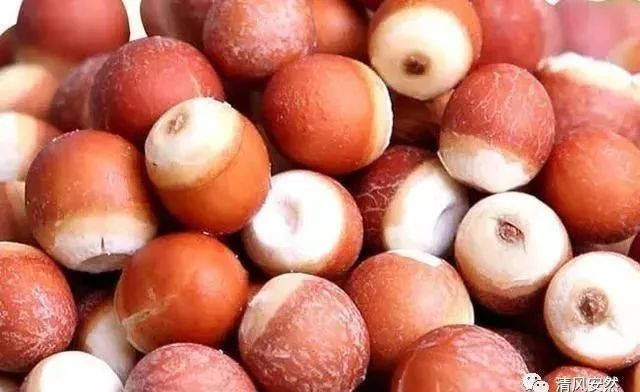
7. Qian Shi (Euryale Seed)
Qian Shi is mentioned in the “Shen Nong’s Herbal Classic” and is regarded as a superior herb for longevity. It is believed to have effects such as “tonifying the middle, eliminating summer heat, benefiting essence and qi, strengthening will, and enhancing clarity of hearing and vision.” It has the effects of strengthening the spleen, eliminating dampness, and benefiting the kidneys and essence.
Qian Shi should be cooked slowly until soft, chewed thoroughly, to nourish the body. Eating Qian Shi with fish heads also has brain-enhancing effects and can treat neurasthenia.
Recommended 3 Formulas for Dampness Removal
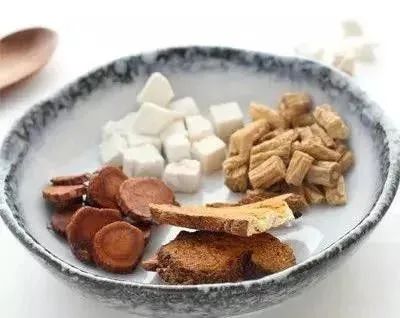
Formula One:
Fu Ling + Bai Mao Gen (White Grass Root) + Hong Zao (Red Dates)
Recommended Recipe: Fu Ling and Bai Mao Gen Soup with Lean Pork
Ingredients: Fresh Fu Ling, appropriate amount; Bai Mao Gen 80g; Hong Zao 10 pieces; Lean pork 400g; Ginger 3 slices.
Method: Wash each ingredient separately. Cut Fu Ling into pieces; cut Bai Mao Gen into sections; pit the Hong Zao. Put all ingredients along with ginger into a clay pot, add 2500ml of water (equivalent to 10 bowls), bring to a boil over high heat, then simmer on low heat for 2 hours, and season with an appropriate amount of salt.
Effect: Eliminates dampness and clears heat and detoxifies.
Formula Two:
Yi Yi Ren + Huang Qi (Astragalus) + Dang Shen (Codonopsis)
Recommended Recipe: Astragalus and Codonopsis Porridge
Ingredients: Huang Qi 15g; Dang Shen 15g; Roasted Yi Yi Ren 60g; Roasted Bian Dou (Hyacinth Bean) 15g; Hong Zao 2 pieces; Rice 100g.
Method: First, roast Yi Yi Ren and Bian Dou until slightly yellow, pit the Hong Zao, wash Huang Qi and Dang Shen with clean water and put them in a clay pot to decoct. After the decoction is ready, remove the dregs, add roasted Yi Yi Ren, roasted Bian Dou, Hong Zao flesh, and rice into the decoction and boil, then simmer on low heat to make porridge.
Effect: Huang Qi and Dang Shen have the effect of strengthening the spleen and benefiting qi, while Yi Yi Ren and Bian Dou can eliminate dampness. This porridge can tonify the middle, benefit qi, strengthen the spleen, and alleviate discomfort caused by excess dampness.
Formula Three:
Fu Ling + Chen Pi (Dried Tangerine Peel)
Recommended Recipe: Chen Pi and Fu Ling Tea
Ingredients: Fu Ling 5g; Chen Pi 2g.
Method: Wash Fu Ling and Chen Pi, place them in a thermos cup, pour in hot water, and wait for 5 minutes before drinking.
Effect: Chen Pi regulates qi and strengthens the spleen, dries dampness, and transforms phlegm. It is used for abdominal fullness, reduced appetite, vomiting and diarrhea, and cough with phlegm; Fu Ling promotes urination and drains dampness, strengthens the spleen, and calms the mind. Drinking this tea can strengthen the spleen, drain dampness, transform phlegm, aid in weight loss, and strengthen the spleen while drying dampness and transforming phlegm to eliminate fat.

